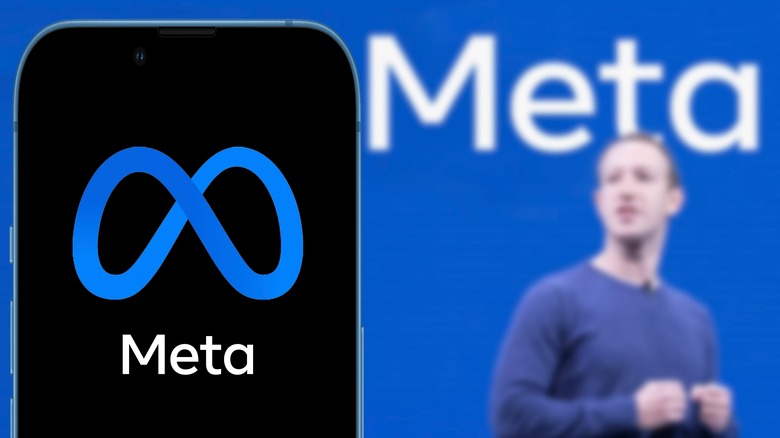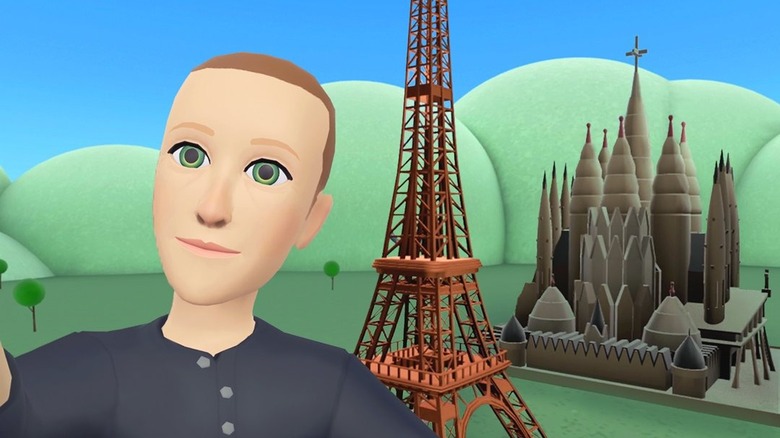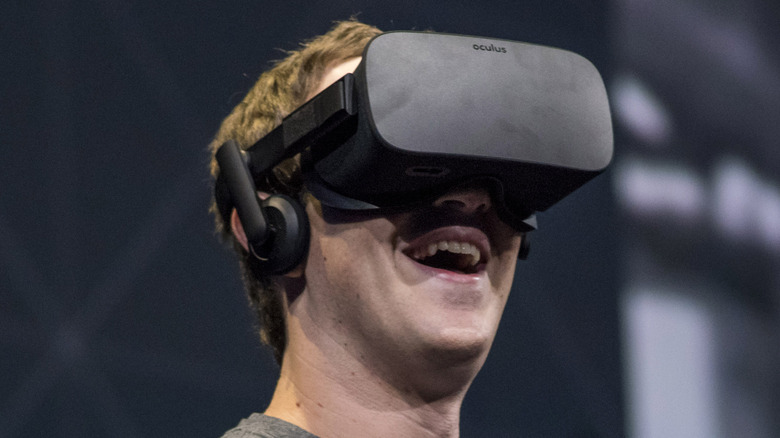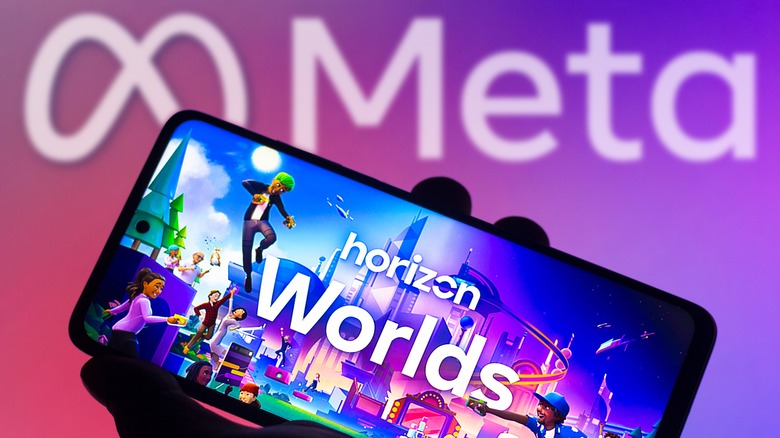The Weirdest Things That Happened During The Creation Of Meta
The company formerly known as Facebook has been both loved and hated over the years, but its influence is undeniable. From a dorm room at Harvard, Facebook emerged as the dominant player in social media, reaching a billion users by 2012. It upended the way we communicate, made the concept of "Facebook official" relationships a thing, and completed its dominance by snapping up hot new social apps such as Instagram and WhatsApp. But as the company followed founder Mark Zuckerberg's "Move fast and break things" motto, the disasters began to pile up. The social network was putting elections at risk. It was held responsible by a major human rights organization for genocide in Myanmar (via PBS).
As Facebook's public image cratered, CEO Mark Zuckerberg announced one of the largest pivots in tech history. As of October 2021, the company formerly known as Facebook was now called Meta, and its mission was to develop something called "the metaverse." Think "Ready Player One" but without the sense of childlike, nostalgic wonder. Think being forced to strap a box to your head as a prerequisite for joining that Zoom meeting that could have been an email.
Directing attention away from the product that made Facebook a household name was strange on its own. However, given that Meta had seen some success in the virtual reality space since its acquisition of Oculus, the move wasn't entirely illogical. But since the reorganization, the arc of Meta's trajectory has been spectacularly bizarre. From the humorous to the surreal, and even the disconcerting and concerning, here are the weirdest things that happened during the creation of Meta and its metaverse.
Zuckerberg's avatar was almost as lifeless as the real thing
When Meta founder and noted barbeque sauce enthusiast Mark Zuckerberg unveiled the metaverse in October of 2021, few knew what to make of the sea change. Despite Facebook's floundering and a loss of public trust, Zuckerberg had irrevocably changed the world once before, and it was possible he would do so again. But the product demos Meta showed off were uncanny, to say the least, and the notion that Meta's metaverse products are underbaked only grew from that point forward.
It didn't help that Zuckerberg, who has often presented in public as awkward and a bit robotic, demoed the product himself, stepping into a virtual world as an avatar of himself that was somehow more lifelike than the real thing while also looking like a Nintendo Mii avatar from 2006. Some may have reasoned that it was still early days, and that the graphics would improve over time. But when Zuckerberg posted a VR selfie from the VR Eiffel Tower one full year later, it became evident that Meta was lagging behind even third-party metaverse apps. In many ways, Zuckerberg's metaverse avatar was even worse than it had looked at launch, and the internet seized on the moment to mock him with memes (via Business Insider).
But Meta and Zuckerberg's self-inflicted public shaming was far from over.
Now introducing legs!
One thing most people have in the real world is a pair of legs. It's easy to take them for granted, as Mark Zuckerberg reminded the public with Meta's most roundly mocked feature announcement. In October 2022, the "Meta Horizon" Twitter account posted, "Legs coming soon! Are you excited?" The tweet was accompanied by a video of Zuckerberg's low-polygon-count digital form jumping up and down. It did, indeed, have legs.
But if Zuckerberg was expecting people to jump for joy (pun intended), the bizarre announcement had the opposite effect, reminding people just how bafflingly far behind smaller competitors Meta's multibillion-dollar VR platform was. Other social VR platforms, such as the widely popular VR Chat, have had head-to-toe avatars for quite some time, and allow for a much broader range of virtual expression. Pretending that the addition of legs to "Horizon" avatars was some sort of great leap forward only reiterated to the public how out-of-touch Zuckerberg seemed to be.
The legs announcement would turn out to be weirder and even more pathetic than it first seemed, as the hilarious truth about the legs came to light shortly thereafter.
Never mind, the legs were a lie
Despite the surreal and head-scratching nature of Meta's legs announcement, no one had any reason to doubt its veracity. A company of Meta's size should have no trouble adding legs to VR avatars because it seems like a basic, bare bones feature. And yet, the legs turned out to be a lie. As SlashGear reported, Meta admitted it added the legs using motion capture technology to create the announcement video. As of this writing, users of "Meta Horizons" are still rendered from the waist up, floating above the ground like ghosts.
All of this prompts questions about why Meta made a big splash over adding legs in the first place. Sure, the company needed a public relations boost, but who thought that boost should come in the form of legs for digital avatars? For most major tech companies, such a feature would barely be worth a tweet. And why lie about it when it was almost inevitable the deception would be quickly revealed? The entire debacle feels like a satirical plot point from HBO's "Silicon Valley." In other words, it feels like a complete inability to read the room. One thing is for sure, though: Meta's legs announcement provided excellent meme fodder.
Commercials from the nightmare realm
An animatronic dog plays '80s music in a pizzeria with his animatronic friends. But when the restaurant shuts down, he winds up in a pawn shop and is eventually fed into a trash compactor after being left on the side of the road, where foxes pick at his fur. His friends are long gone. Things look bleak. But then he discovers a VR headset, and when he puts it on, he can live in a digital world where he finds his lost friends in a virtual recreation of their old pizzeria haunt. No, this is not an episode of "Black Mirror." It's a Superbowl commercial for the Meta Quest 2.
As part of its push to get people on the metaverse bandwagon, Meta began running commercials showcasing the benefits of life in VR. It would seem like a simple assignment. Just show people working, gaming, or using another aspect of the metaverse together. And while plenty of Meta's ads do just that, a few are far more bizarre, and a couple are actively upsetting to watch.
Prior to the existentially terrifying animatronic dog commercial, which suggests that in the desolate ruins of the real world, our only hope for a brighter future lies in Zuckerberg's kingdom of VR nightmares, Meta ran an ad titled, "The Tiger & The Buffalo." Before you click that link, we must warn you, you will never be able to unsee it. It's unclear what this ad has to do with VR. Maybe the point is that VR can subject us to manmade horrors beyond comprehension, in which case, mission accomplished. But as far as we can tell, it's meant to warn teenagers about the dangers of tripping on psychedelic drugs in an art gallery. Everything about this is awful. Please make it stop.
Investors panicking as Zuck sticks to his VR guns
Since its inception, Mark Zuckerberg has retained full control of the company formerly known as Facebook. Though that control has been contested (we've all seen "The Social Network"), it cannot be undermined because the Zuckerberg and his inner circle own the controlling stock in what's called a dual-class structure (via Business Insider). Investors can sell their Meta shares, but they can't force Zuckerberg out.
In the past, as Meta raked in cash hand-over-fist, that arrangement has been just fine for investors. But as Zuckerberg appears hell-bent on throwing money at the metaverse until it sticks, they're beginning to panic. In October 2022, a shareholder wrote an open letter to Zuckerberg and Meta pleading for the company to stop shoveling money into the gaping maw of the metaverse, noting that investors were losing confidence in the company.
The notion that a major, publicly traded tech giant, would deliberately crater its profitability to chase a Quixotic vision is almost unheard of. Companies such as Amazon have, in the past, employed a strategy of losing money to gain market share, but the strategy largely worked, as Amazon dominated nearly every industry it entered. Meta is a different story. Despite massive spending on the metaverse, Meta headset sales haven't gained much steam, and it's unlikely you've found yourself attending a work meeting in "Horizons." The Meta Quest 2 may be the most popular VR set, but the majority of people still haven't bought into VR at all, let alone on Meta's terms, as found last year by a SlashGear poll.
Investors are right to worry. SlashGear named Meta one of the biggest tech failures of 2022 for a reason, but Zuckerberg shows no signs of slowing down his aggressive bid to dominate the future of connectivity.
Meta lost billions, and plans to lose more
Perhaps the most clear-cut proof that Meta's quest (ba-dum-tss) to monopolize the metaverse is going poorly are the cold, hard numbers. In Q4 of 2021, Meta's legacy apps, which include Facebook, Messenger, Instagram, and WhatsApp, made healthy profits, and yet the money lost on the company's VR division, Reality Labs, was to neutralize those gains. All told, while Meta made $15.9 billion on its old-school apps, it lost a staggering $10 billion.
Many market speculators warned not to write the company off yet. After all, building something as ambitious as the metaverse was going to take time. But rather than press on the brakes as Meta rounded a corner, Mark Zuckerberg keeps pressing on the gas. As reported by CNBC, during a call with investors in October 2022, the founder fielded questions from frustrated investors as stock prices floundered. In fact, the company had spent a bowel-churning $22.1 billion during that quarter alone and its profits had dropped almost 50% from the prior year. But rather than backing down, Zuckerberg only reaffirmed his plans to continue pouring money into Reality Labs, predicting that Meta's VR division would continue to operate at a loss through 2023.
Meta will post its end-of-the-year earnings for 2022 sometime in February 2023, and the graphs are expected to continue their downward trend. If the metaverse gamble doesn't pay off soon, it's unclear how much longer the spending spree can continue.
Even Meta's staff won't use the metaverse
If you want to measure the quality of a tech company's product, one of the first things to consider is whether the employees of the company actually use it. And in the case of Meta's metaverse products, the internal answer has been a resounding, "No."
When Meta began insisting that its employees hold more remote meetings in the Horizon Workrooms app, it quickly became apparent that many employees didn't even own one of the company's headsets, and among those who did, quite a few hadn't even gone through the setup process. It's hard to blame them, as Horizon Workrooms and its corresponding Horizon Worlds social app have turned off even early adopters and tech enthusiasts. In a striking example of the lingering problems with Meta's software, The Verge's review of the Quest Pro headset devolved into chaos as Verge coworkers struggled to locate each other in the VR environment, encountered glitches, and (most concerningly) saw a female reporter immediately swarmed and sexually harassed by other users. "I don't know what's salvageable in this experience," one reporter said in bafflement.
October 2022 seems to have been a watershed moment for Meta's VR ambitions. It was the month stocks took their heaviest pummeling, investors began to panic, and, of course, the month of the infamous legs announcement. In other words, it was when the tech industry began to recognize that the metaverse was not the inevitable next step in humanity's technological evolution but merely a billionaire passion project. Ultimately, Zuckerberg was only saved further embarrassment when fellow tech billionaire Elon Musk sucked away the media's attention at the end of October by finally entering Twitter's headquarters, sink in tow, followed by the collapse of billionaire Sam Bankman-Fried's cryptocurrency empire.
Metaverse users are being virtually harassed and assaulted
The internet has proven time and again that it will always find a way to extend the worst of the real world into digital spaces, especially when it comes to sexual harassment and misogyny. In spaces such as message boards, where one's gender isn't readily apparent, women often rely on that anonymity in order to avoid such treatment. For instance, according to research from 2022, fewer than one in five women risk talking to others in gaming voice chats for fear of being subjected to abuse, despite women making up 45% of gamers (via FandomSpot). That's merely one example of too many to count, and the metaverse is only exacerbating the problem.
In February 2022, Meta was forced to add a Personal Boundary feature in "Horizon Worlds" because users won't keep their digital hands to themselves. But it wasn't enough to stop the problem. In May, a female researcher was virtually raped by other users in "Horizon Worlds," and the details of the incident involved male users trapping her avatar in a corner and simulating sexual acts while passing around a virtual bottle of alcohol (via Sum of Us). And, as noted above, a female reporter from The Verge was immediately swarmed and harassed by other users while attempting to conduct a review of the software.
Frankly, this is an issue Meta of all companies should have seen coming. Facebook has been a hotbed of virtual harassment and bullying for well over a decade, and the fact they seem to have learned very little regarding how to combat it is honestly bizarre, reflecting a shockingly cavalier attitude on the part of the company toward such behavior. If Meta wants people to live their lives in a digital world, the least it can do is make those worlds safe.
If you or anyone you know has been a victim of sexual assault, help is available. Visit the Rape, Abuse & Incest National Network website or contact RAINN's National Helpline at 1-800-656-HOPE (4673).
Meta made a years old headset more expensive
One of the biggest draws for the Meta Quest 2 (formerly the Oculus Quest 2) was its price point. For one Washington shy of $300, users could dive into the best standalone VR experience on offer, gaining access to a wide library of games, social and productivity apps, and more. It has a crisp display with excellent head tracking features, consistent updates with quality-of-life improvements, and quickly became the best-selling VR headset on the planet when it was released in October 2020.
But in July 2022, Meta unexpectedly raised the price of the Quest 2 by $100. The headset now starts at $399 for the 128GB model, making the value proposition of the device significantly worse than before, especially given that it had been out for nearly two years at the time of the increase.
One likely explanation for the price hike on the Quest 2 is Meta's increasingly dire financial straits. The company may be attempting to recoup losses on research and development by jacking up the price on its best-selling piece of hardware, increasing margins per unit to fund the Reality Labs division. Whatever the cause, the move turned off potential buyers. A SlashGear poll found that 77% of respondents would no longer consider purchasing a Quest 2 at its new price.
Given everything that's happened since the company's rebranding, Meta's weird and wild ride through the metaverse is increasingly looking like a windmill chase by a company desperate to escape Facebook's reputation, propelled by a CEO who cannot be overruled. The company has a hard uphill battle if it wants to make the metaverse mainstream.









